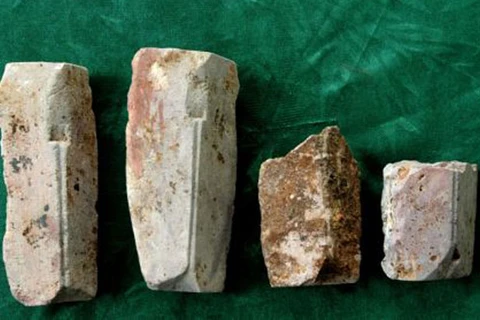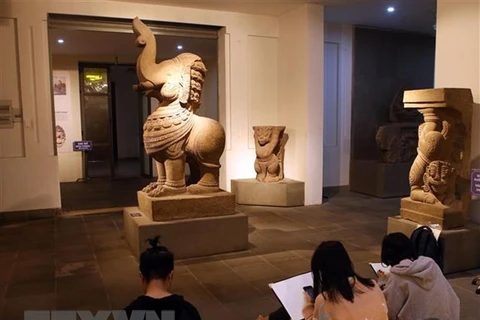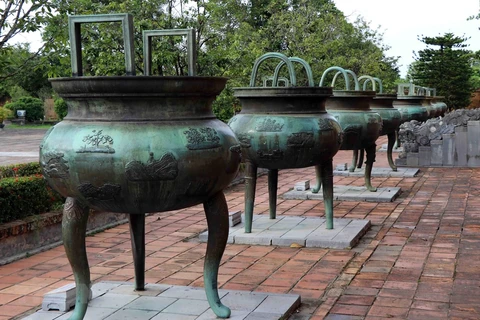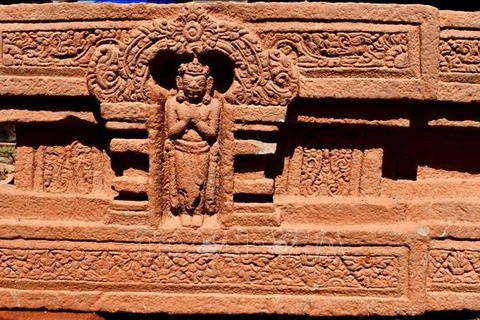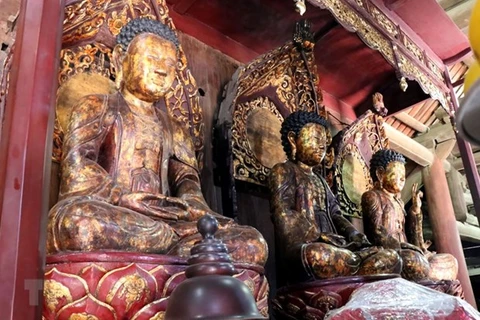 The giant screen of the Diem Communal House has four parts arranged vertically, stretching from the roof to the floor. (Photo: Vietnam Pictorial)
The giant screen of the Diem Communal House has four parts arranged vertically, stretching from the roof to the floor. (Photo: Vietnam Pictorial) Hanoi (VNA) – The communal house of Diem village in Hoa Long ward of Bac Ninh city is one of the tourist destinations in the northern province of Bac Ninh as it is home to a screen that is considered a woodcarving masterpiece.
Built in 1692, the Diem Communal House is dedicated to Tam Giang Saints, who were Truong Hong and Truong Hat, who accompanied King Trieu Viet Vuong in the fight against the Liang invaders in the 6th century.
It was recognised as a national treasure in January 2020.
The Diem Communal House boasts typical architectural features of a communal house in the Red River Delta. But what makes it special is a giant and magnificent screen called “cua vong” with sophisticated carvings.
Located inside “dai dinh” (the main hall of the communal house), this screen dates back more than 300 years and is 7 metres in height and 3.9 metres in width. It is completely covered with red lacquer trimmed with gold.
The screen has four main parts which are arranged on top of each other and decorated with sophisticated and vivid carvings, making it an imposing but also meticulous artwork.
The four main parts have different themes but are still harmoniously connected with one another. They feature carvings of the Four Mythological Creatures (dragon, kylin, tortoise, and phoenix) or daily work activities, as well as those expressing the aspiration for fertility and prosperity.
The top section of the “cua vong” is carved with images of the sun and clouds. The lower section gathers sophisticated decorations, with highlights being the sculptures of four fairies standing on clouds and looking down. The next one stands out thanks to eye-catching dragon carvings. Meanwhile, the bottom part with carvings of sacred animals covers the altar.
Among hundreds of carvings of mythological creatures, only those of the tortoise can be easily seen while the remainders are merged with other details, challenging the imagination of viewers.
The “cua vong” of the Diem Communal House has a complex structure but also a balanced and harmonious layout with vivid patterns, which illustrates the high aesthetic capacity of artisans in the past. It is remarkable for not only its size or carving techniques but also its unique themes reflected in lively details and decorations.
The screen is an original object that has outstanding technical and aesthetic values compared to others in Vietnam. Given this, it is viewed as the most typical demonstration of the art of wood carving in the Le Trung Hung (Revival Le) Dynasty (1533 - 1788).
Situated in a village on the banks of the Nhu Nguyet River, the Diem Communal House - a national architectural and artistic relic site - and its valuable antiquities are the cultural essence of the land of Kinh Bac and also one of the precious cultural treasures of the nation.
Apart from thư Diem Communal House, Hoa Long ward of Bac Ninh city is also home to many other old communal houses, temples, and pagodas.
The “cua vong” of the Diem Communal House is one of the two national treasures of Bac Ninh province recognised in January 2020. The other is the 12 stone steles recording doctoral laureates at “Van Mieu” (Temple of Literature) in Bac Ninh city. These stone steles, 1.1 metres high, 0.75 metre wide, and 0.09 metre thick, were made in 1889./.

